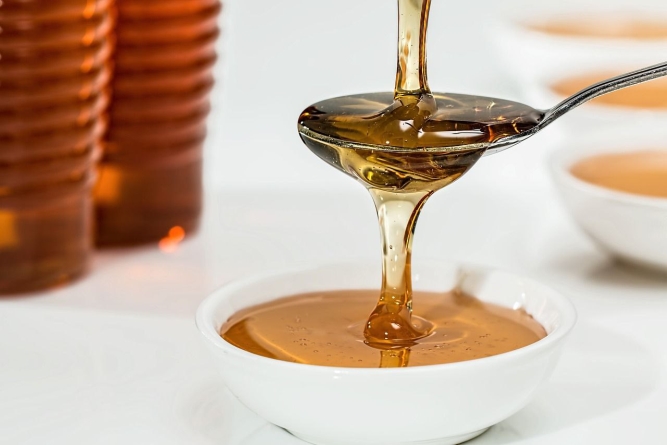Honey boasts a wealth of nutrients and antioxidants, possesses antibacterial qualities, and can contribute to diabetes management when incorporated into a well-rounded diet. And there’s more to its benefits than just that.

Honey, a viscous substance crafted by honeybees from plant nectar, finds widespread use as an ingredient in various culinary creations and comes in diverse forms.
Beyond its culinary applications, honey offers numerous potential health advantages and features prominently in various home remedies and alternative medical practices.
Discover seven distinct health perks attributed to honey.
Contains a Bunch of Nutrients
One tablespoon, equating to approximately 20 grams (g) of honey, provides the following nutritional breakdown:
- Calories: 61
- Fat: 0 g
- Protein: 0 g
- Carbohydrates: 17 g
- Fiber: 0 g
- Riboflavin: 1% of the Daily Value (DV)
- Copper: 1% DV
Honey is primarily comprised of pure sugar, devoid of fat, and contains only minimal amounts of protein and fiber. While it does contain modest quantities of certain nutrients, the average consumption of honey by most individuals isn’t substantial enough for it to serve as a significant dietary source of vitamins and minerals.
Nevertheless, it’s noteworthy that honey is abundant in health-supporting plant compounds called polyphenols.
Better for Blood Sugar than Regular Sugar
When it comes to managing blood sugar levels, honey might offer a slight edge over regular sugar.
While honey does elevate blood sugar levels similarly to other sugars, its antioxidant content could potentially shield against metabolic syndrome and type 2 diabetes.
Studies suggest that honey may boost adiponectin levels, a hormone linked to reduced inflammation and enhanced blood sugar control. Additionally, evidence indicates that daily honey consumption could enhance fasting blood sugar levels in individuals with type 2 diabetes.
Nevertheless, while honey may present a slightly better option than refined sugar for those with diabetes, it’s essential to consume it in moderation.
Furthermore, it’s crucial to be aware that some producers dilute honey with plain syrup. Despite honey adulteration being illegal in most countries, it remains a prevalent issue.
Very Rich in Antioxidants
Raw honey, undergoing minimal processing, harbors a plethora of vital bioactive plant compounds and antioxidants like flavonoids and phenolic acids. Typically, darker varieties boast higher antioxidant levels compared to their lighter counterparts.
Antioxidants play a pivotal role in neutralizing reactive oxygen species (ROS) within the body, which, when left unchecked, can accumulate in cells and induce damage. Such damage is implicated in various conditions such as premature aging, type 2 diabetes, and heart disease.
Consequently, much of honey’s therapeutic potential is linked to its rich antioxidant profile.
May Improve Heart Health
Honey could potentially contribute to heart disease prevention. A review suggests that honey might aid in lowering blood pressure, enhancing blood lipid profiles, regulating heart rhythm, and safeguarding healthy cell survival—factors that collectively promote heart function and overall cardiovascular health.
Moreover, an observational study involving over 4,500 individuals aged 40 and above found a connection between moderate honey consumption and a reduced risk of high blood pressure, particularly among women. Additionally, a rodent study demonstrated honey’s ability to shield the heart from oxidative stress.
Furthermore, raw honey typically contains propolis, a resin derived from sap-producing trees and similar plants by bees. Propolis is thought to have potential benefits in improving cholesterol and triglyceride levels.
However, despite these promising findings, there is currently a lack of long-term human studies investigating the direct impact of honey on heart health. Therefore, further research is warranted to gain a comprehensive understanding of honey’s effects on cardiovascular well-being.
Burn and Wounds Healing Capabilities
Throughout history, topical honey treatment has been utilized for wound and burn healing, a practice that persists today.
A comprehensive review of 26 studies investigating honey’s role in wound care revealed its remarkable efficacy, particularly in the healing of partial-thickness burns and infected post-surgery wounds.
Of note, Manuka honey, in particular, exhibits promising potential for burn treatments. However, it’s crucial to emphasize that in cases of severe burns, home remedies cannot replace urgent medical intervention. Immediate medical attention is imperative.
Researchers posit that honey’s healing prowess stems from its antibacterial and anti-inflammatory properties.
May Help out with Coughing in Children
Coughing poses a common challenge for children grappling with upper respiratory infections, impacting both their and their parents’ sleep and overall quality of life.
A review encompassing multiple studies examining honey’s efficacy in managing coughs among children suggests that honey might outperform diphenhydramine in alleviating cough symptoms and potentially shortening cough duration.
Moreover, another review highlights honey’s potential to enhance sleep quality in children with coughs, as well as in their parents. Notably, unlike certain cough medications, honey is devoid of adverse effects.
Nevertheless, it’s imperative to underscore the caution against administering honey to children under the age of one due to the risk of botulism.
Easy to Include in your Diet
Incorporating honey into your diet is straightforward and versatile. You can easily substitute it for sugar to add a touch of antioxidants to your meals and beverages. Whether sweetening plain yogurt, coffee, or tea, or incorporating it into your cooking and baking, honey provides a flavorful option.
It’s important to bear in mind, however, that honey is a form of sugar, so its consumption will elevate your blood sugar levels. Overindulging in honey, particularly over an extended period, may lead to weight gain and heighten the risk of conditions such as type 2 diabetes and heart disease. Moderation is key when enjoying honey as part of your diet.
For more information contact us at hello@jilisheafrica.com